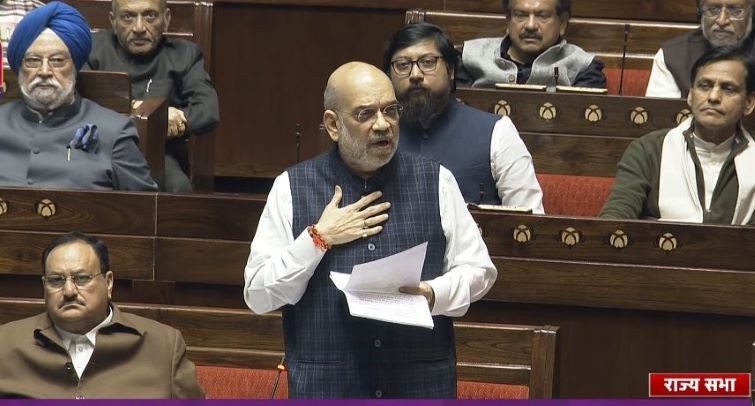 Amit Shah
Image tweeted by BJP4India
Amit Shah
Image tweeted by BJP4India
'Our govt broke the back of terrorism in J&K': Amit Shah in RS after Supreme Court verdict on Article 370
New Delhi: Union Home Minister Amit Shah hailed the Supreme Court verdict upholding the validity of the Centre's decision to abrogate Article 370 that granted special status to Jammu and Kashmir as he addressed the Rajya Sabha on Monday.
Replying to the discussion on The Jammu & Kashmir Reservation (Amend) Bill, 2023 and The Jammu and Kashmir Reorganisation (Amend) Bill, 2023, both of which were passed by the Upper House this evening, Shah said: “If Article 370 was so fair, so needful, then why would Nehru ji use the word temporary in front of it? Those who say that Article 370 is permanent are insulting the intention of the Constituent Assembly and the Constitution."
"The Supreme Court has said that Article 370 was a temporary provision, which means that this claim of the petitioner that Article 370 can never be removed, has been completely rejected by the Supreme Court...," he told the Upper House.
This comes after the Supreme Court earlier in the day ruled that the central government's historic 2019 move to scrap Article 370 withdrawing the special status of Jammu and Kashmir is "valid".
A five-juddge bench, headed by Chief Justice of India DY Chandrachud, hearing the pleas challenging the revocation of the special status of Jammu and Kashmir, said Article 370 was a temporary provision that was meant to facilitate the region's merger with India.
During his Rajya Sabha address, Shah said that 24 seats have been reserved in Pakistan-occupied Kashmir.
“I am repeating this. Pakistan-occupied-Kashmir is ours and no one can take it from us," the Union Home Minister said."
He said that the BJP government broke the back of terrorism in Jammu and Kashmir as only 2,197 terrorist incidents took place in the last 10 years as against 7,217 such acts between 2004-2014.
"There are other states with more Muslim population than Kashmir. Then why only J&K was suffering from terrorism? It was because Article 370 led to separatism," Shah said, pointing out that the top court, in its judgment, said the Article was temporary in nature, meant only to ease Jammu and Kashmir into being a part of India.
"Today, the Congress said in its press conference that Article 370 was scrapped incorrectly. Even after the Supreme Court verdict, they are saying that they don't agree to this," Shah said.
Due to the government's move to mainstream Jammu and Kashmir, the lives of people there have improved, the minister said.
The government's move to mainstream Jammu and Kashmir has ensured that the lives of people there have improved, the minister said.4
"Kashmiris don't listen to people who talk about terrorism and separatism, they now listen to talks of democracy… Before 2014, thousands used to attend the funerals of terrorists. Does anyone see anything like that now? This happened because we made a provision that their last rites will happen at the spot they were killed," he said.
"Stone-pelting cases have come down due to our rule that if anyone has a stone-pelting case against them, no one from their family would be eligible for a government job," he said adding that the government has handed laptops to young people who were carrying stones. "We are close to a terrorism-free Kashmir," he said.
The Supreme Court has also ordered the Election Commission of India to hold elections in Jammu and Kashmir by Sept 30, 2024.
It said that Article 370 was only a transitory provision during the wartime conditions in J&K.
"It was for a temporary purpose because of war conditions in the State. Textual reading also shows it is a temporary provision and thus it was placed in part 21 of the Constitution," the top court said.
Besides scrapping Article 370 soon after winning the elections in 2019, the Narendra Modi government also scrapped Article 35A, which was used to define "permanent residents" of Jammu and Kashmir barring non-residents from buying immovable assets in the valley.
The Centre had then bifurcated Jammu and Kashmir into two Union Territories- Jammu and Kashmir with an assembly and Ladakh without an assembly.
In August this year, the Centre told the Supreme Court that it was ready to hold elections any time in Jammu and Kashmir, but could not give an exact timeline for restoring its statehood.
Top Headlines
-
News
Ali Khamenei (19392026): Irans Supreme Leader who ruled with an iron grip
March 01, 2026
-
News
Ali Khamenei (19392026): Irans Supreme Leader who ruled with an iron grip
March 01, 2026
-
News
Ayatollah Ali Khamenei killed in US-Israeli Air Strikes; Irans Revolutionary Guards vow sweeping retaliation
March 01, 2026
-
News
PM Modi expresses displeasure over NCERT judiciary chapter, wants accountability fixed
February 26, 2026
-
News
Former New Zealand PM Jacinda Ardern to relocate to Australia amid growing Kiwi exodus
February 26, 2026
-
News
Major aviation boost for Kashmir: Cabinet clears development of a new Civil Enclave at Srinagar International Airport
February 24, 2026
-
News
India urges all nationals to leave Iran 'by available means' as US-Iran tension grows
February 23, 2026
-
News
Ind.AI: Sovereignty, jobs, energy and the What If?
February 20, 2026
-
News
From car diplomacy to global strategy: Modi, Macron upgrade IndiaFrance ties
February 17, 2026
-
News
Seva Teerth: PM Modi inaugurates new PMO, announces these key decisions on first day
February 13, 2026





